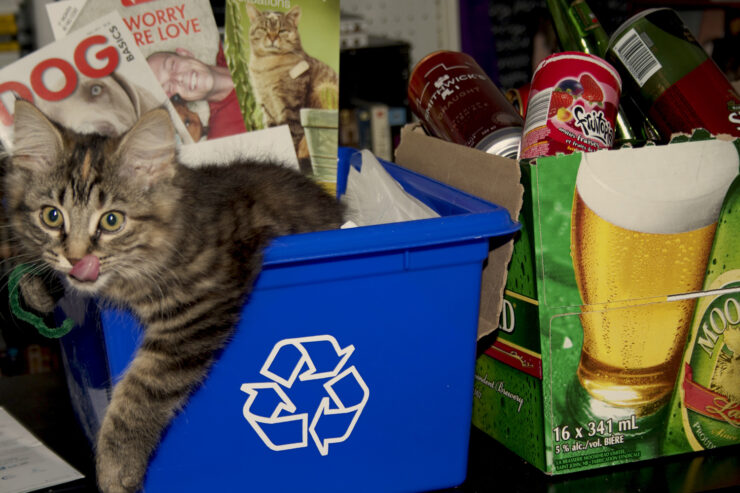CONFESSION TIME: I  have a cat. This is a confession, because more often than not I discourage my friends who are students from getting pets. I cringe when I hear about the break-up cat adoption. I grind my teeth when I hear about the couple moving in and getting a dog—in third year. I want to gather all these people, and scream at them to not do it.
have a cat. This is a confession, because more often than not I discourage my friends who are students from getting pets. I cringe when I hear about the break-up cat adoption. I grind my teeth when I hear about the couple moving in and getting a dog—in third year. I want to gather all these people, and scream at them to not do it.
It’s not that my cat torments me or anything. I’ve never once regretted adopting him, but because I have my cat I know what these people are getting into—something I’m not sure they’re aware of.
Mandy Chepeka of the Ottawa Humane Society (OHS) has plenty of experience dealing with pets once their owners realize how unprepared they were for a pet. As part of the adoption process, the OHS has a series of questions they ask owners, and things they want potential candidates to consider before taking a new pet home.
“Is it the right time for you to acquire a pet? If you’re planning a move and you don’t think you’d be able to take your pet with you, that’s not a good thing,” says Chepeka. “If you’re getting back to being a student and… you’re in class all day long and no one is at home to let the dog out, [if] you’re not going to be in the city for four months of the year and you have no way of transporting it or bringing it home, then that’s not a good situation either.
“You have to have the time to put into it, and that’s going to vary depending on the type of animal you’re adopting, but you’re going to have to walk, train, and give physical and mental stimulation to a pet every single day.”
The most decisive factor, at least for cash-strapped students, is how much it costs to have a pet. After all, getting a pet is easy; however, Chepeka warns against getting taken in by the so-called free kitten or puppy.
“It’s going to cost, annually, between $1,000 and $2,000 for a dog, and between $800 and $900 annually for a cat; that’s every year.”
Right off the bat, you’d better make sure you’ve got the money to get your pet fixed.
“There’s a whole myriad of things that are associated with responsible pet ownership, not the least of which is spaying or neutering your dog. It’s at the top of the list, actually, to prevent all those unwanted litters that unfortunately keep us in business.”
Sure, you wanted to go on a shopping trip, but the card has come from the vet letting you know that Fluffy is due for her check up and vaccinations. Seeing the vet is going to put you out $70 at any clinic in Ottawa, and then you’ve got to pay for vaccines and any other treatments your pet might need.
I also hope you’re not the sort of person who flirts with their credit limit, because pets have a habit of needing really expensive vet care at the worst possible moments. And when I say expensive, I don’t mean missing-out-on-that-new-pair-of-shoes-you-were-eyeing expensive—I mean a-trip-to-Cuba-for-two expensive.
A question Chepeka wants students to ask themselves before adopting is, “Can you afford $2,000 orthopedic surgery if your dog’s leg is severely broken? If you can’t, then you’re not a responsible pet owner. Because your pet is yours for the life of the pet, and that can be 20 years, so that’s another thing that people need to think about.”
Over the course of 20 years, the average student is likely to move a lot, graduate at least once, and possibly switch schools, not to mention the possibility of ending up unemployed and looking for work. And then, as those 20 years roll by, you’ll probably meet someone—will they be a cat or dog person, or even a pet person? What if you have kids—are you going to make an effort to socialize both your kid and your pet? There’s nothing that makes my teeth-grinding worse than hearing about older dogs, who don’t get adopted anywhere near as often as puppies, ending up at the Humane Society because someone had a kid and “they didn’t get along.”
Long-term commitment aside, there are the day-to-day responsibilities too, as Chepeka points out.
“The other things besides the costs, you also have to be responsible for providing the basics. If you’re not feeding and sheltering your pet, such that you’re causing neglect or abuse, you’re going to be charged.
“You could potentially go to jail, potentially face steep fines. And that’s the law now, so you have to give your pet the basic necessities of life, and that’s food, water, shelter, proper exercise, and regular vet checks. It can’t just be, ‘Oh, it got vaccinated when I adopted it. I don’t have to vaccinate it anymore.’ You have to.”
If you can’t do all this, Chepeka (and I) want you to know you shouldn’t be adopting a pet.
“Your pet is not your pet until something happens. Your pet is your pet for the life of it. If you haven’t thought that through, then you shouldn’t be adopting a pet.”
And if you have adopted a pet and can’t look after it the way it needs to, you have options—ones that don’t involve some of the more horrible things I’ve heard about this year involving dumpsters.
“If something happens, and it’s catastrophic and you can no longer keep the pet, absolutely think about re-homing it with friends or family,” Chepeka advises. “But make sure they understand all of the things I’ve talked about, so that they understand what being a responsible pet owner is, and they’re not going to dump it at the first sight of something going wrong.”
“If you still can’t keep your pet, and you can’t re-home it either, you can surrender it to the [OHS]. It becomes our property, you can’t adopt it back, you can’t acquire it again via any means, and we will re-home it and adopt it out if it’s deemed adoptable.”
Chepeka neatly sums up my feelings on the subject of students (or anyone) adopting an animal they’re not prepared to care for.
“It’s not fair to the animal to sit at home all day, never going outside, never having human contact, never getting any exercise, and then being passed around from roommate to roommate until somebody can actually give it some care. It’s not fair to the animal, [and] it’s not being a responsible pet owner.”
So please, before you adopt, think everything through. How are your savings? What’s your schedule like? Where will you be in 20 years? Are you willing to organize your vacations, roommates, and life partners around your pet? Because if you’re not sure about these things, do Fluffy a favour and keep walking.
—Eleni Armenakis



